Berlin Lohengrin
Stefan Herheim's Lohengrin at Staatsoper Berlin, 2009
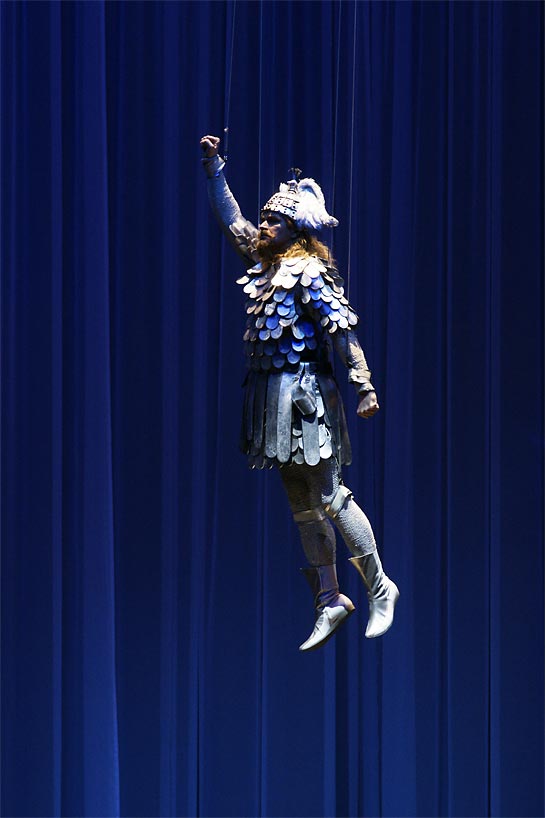
Klaus Florian Vogt in an unbelievable moment at the end of Stefan Herheim's new production of Lohengrin at Staatsoper Berlin. Like a jet engine Lohengrin ascends to heaven where he meets his death and falls down as a puppet, leaving the people Führer-los and bewildered.
Photo: Karl Forster / Staatsoper Berlin
Berlin: Stefan Herheim's new production of Lohengrin at Staatsoper Berlin opened the Easter Festival on 4 April 2009. An enthusiastic audience got a wonderful mixture of tragedy, comedy, kitsch, irony, play, overplay, illusions and broken illusions. The production is thought-provoking, entertaining, deep and superficial. If you can't live with ambivalence - stay away from Wagner. After the multi-layered Parsifal at Bayreuth Herheim repeats the success in Berlin with another magnificent Wagner production.
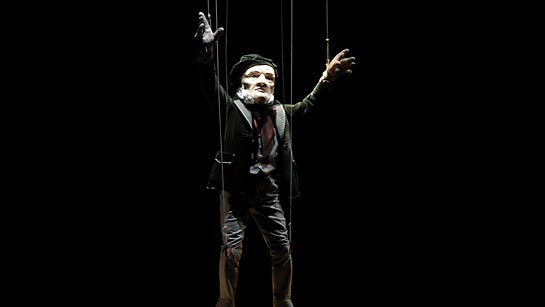
Richard Wagner as a marionette and a man, soon to become a cult figure (read: God) when he is lifted up to the higher spheres. From heaven he drops confetti on Lohengrin and Elsa and probably pulls a string or two.
Photo: Karl Forster / Staatsoper Berlin
Musikalische Leitung Daniel Barenboim
Inszenierung Stefan Herheim
Bühnenbild Heike Scheele
Kostüme Gesine Völlm
Licht Olaf Freese
Video fettFilm (Möller | Hinrichs)
Chöre Eberhard Friedrich
Dramaturgie Alexander Meier-Dörzenbach
Heinrich der Vogler Kwangchul Youn
Lohengrin Klaus Florian Vogt
Elsa von Brabant Dorothea Röschmann
Friedrich von Telramund Gerd Grochowski
Ortrud, seine Gemahlin Michaela Schuster
Der Heerrufer des Königs Arttu Kataja
Staatskapelle
Berlin Staatsopernchor
The controversy of the Herheim Barenboim conflict: A wonderful pantomime during the Prelude of the first act showing Richard Wagner as a marionette waking up, creating music, conducting the orchestra and reaching for the spiritual world of the Grail.
The puppet Wagner (played by an actor) ascended to heaven (or a uterus or the Grail) at the climax of the Vorspiel, anticipating Lohengrin's departure the same way. It was good old narrative technique, creating parallels and contrasts.
The two faces of Elsa: Dorothea Röschmann as Elsa von Brabant tried to stay in the naive world of illusions as long as she could, but in the end she could not live with "denialating" dreams and suppression of free thought. She wanted to take control over her own life. The consequences were fatal.
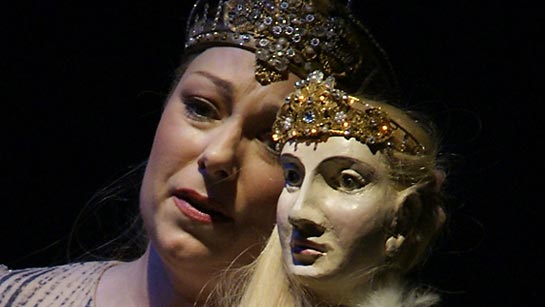
Elsa von Brabant: Des Ritters will ich wahren, er soll mein Streiter sein! Dorothea Röschmann as Elsa von Brabant and the marionette Elsa von Brabant as Elsa von Brabant.
Photo: Karl Forster / Staatsoper Berlin
If you are able to see through the layers of irony, playfulness and surprising solutions, you will find in the core of Stefan Herheim's Lohengrin a deeply moving tale of a woman stuck in a dangerously fictitious world where men rule (remember: it's a man's world), the surpression of individuality is the religion, the fatal submission to totalitarian ideas is the wisdom taught in Sunday school. If you are a noble soul like Elsa or you want to expose the lies (like Ortrud and Telramund) you will either go mad or be killed or left to live with all illusions broken, without dreams, without hope (?), pressed to the ground under the heavy idea of heaven - a heaven that literally descends at the very end - revealing itself as mere theatre machinery.
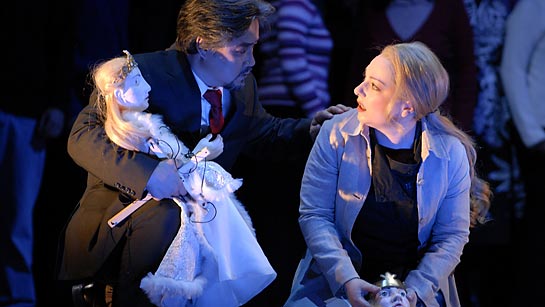
A touch of humanity: King Heinrich (a superb Kwangchul Youn) asks Elsa what she has to say to the grave accusations raised against her. Since meta-theatre themes abound in this production, one could perhaps see King Heinrich as the manager of the theatre and Elsa as the assistent to the director (Telramund).
Photo: Karl Forster / Staatsoper Berlin
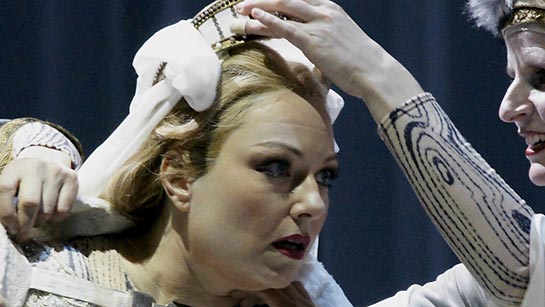
Dorothea Röschmann about to be put in jail get married.
Photo: Karl Forster / Staatsoper Berlin
Marriage as a Herheimian hell: A frightened Elsa (Dorothea Röschmann) being dressed up for a marriage with a man who does not tolerate questions and enquiries. And by the way: Who can live with a man who comes from Glanz und Wonne. There's no doubt that Nacht und Leiden is to be preferred if you want a deeper relationship.
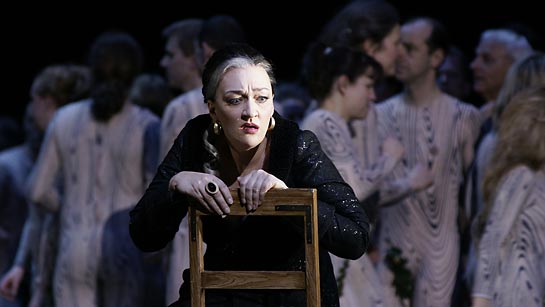
Michaela Schuster's hilarious and demonic Ortrud found her way into my head and heart. An artistic triumph.
Photo: Karl Forster / Staatsoper Berlin
Ortrud (wonderfully overplayed by Michaela Schuster, almost matching Jack Nicholson) is one of the few who sees through the emptiness and the shallow illusions of the Jedermann. She acts as a eye-opener, especially in the scene with Elsa, when she tries to make her see the lies, the denial, the marionette game creating unfreie Menschen. Is she a demon or is she just demonized by society? One thing is for certain: She goes mad, totally mad. And it is a brilliantly played (=overplayed) madness by Michaela Schuster.
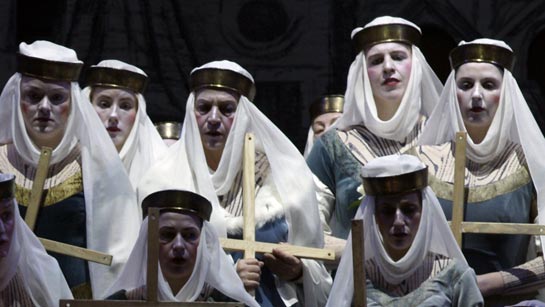
One of the many element used and re-used with a new meaning: The marionette cross.
Photo: Karl Forster / Staatsoper Berlin
Stefan Herheim makes the chorus one of Lohengrin's protagonists. The chorus has always stood for me as one of the great dramatic weaknesses of Lohengrin (as seen through the modern eye). The disturbing mass in Lohengrin (the chorus) shouts how peaceful and submissive they are ("Wir geben Fried und Folge dem Gebot!"), how war willing they are to fight for the German Empire against the terrible enemy ("Wohlauf! Mit Gott für Deutschen Reiches Ehr!"). And there is also a distorted irony when they support Telramund when he asks them "Who of you dares fight against my honour?" and they answer "(sehr lebhaft) Keiner von uns! Wir streiten nur für dich!". Wagner here unintentionally ridicules the Volk that were supposed to be so echt und urdeutsch. The chorus also has the usual commentary function, which basically is saying what they see, like three year old kids do when they see a bird: Look! A swan!
Anyhow, Herheim lets this war loving, submissive and narrow-minded mass with dissolved individuality get an exciting part of the opera, probably never seen before in any Lohengrin production (except Peter Konwitschny's brilliantly conceived classroom Lohengrin). The mass needs the illusions, the scapegoats, the black and white terminology and someone to lead them. But then Herheim makes one of his ingenious moves. At the beginning of the third scene of Act 3 the people's consciousness is awaking. The military fanfares sounds from all sides causing anxiety and verzweiflung. They try to keep the nightmarish sounds away, but they are trapped. They go to the front of the stage. They are shocked to find the orchestra playing in the pit. They can't believe what they see and hear. They are like the six characters in search of an author in Luigi Pirandello's play. When the people discover that they are part of a play, they get a tragic dimension. It was a great moment for me. Herheim made the impossible possible: The chorus struggles with existential problems: Who are we? Why are we here? What is happening?
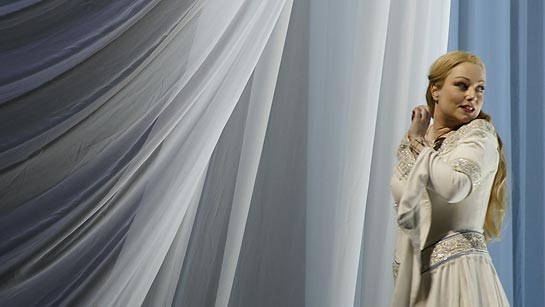
The beautiful Dorothea Röschmann as Elsa, when she still is enchanted by her lover's derailment song about the sweet fragrances. After a while she wants more.
Photo: Karl Forster / Staatsoper Berlin
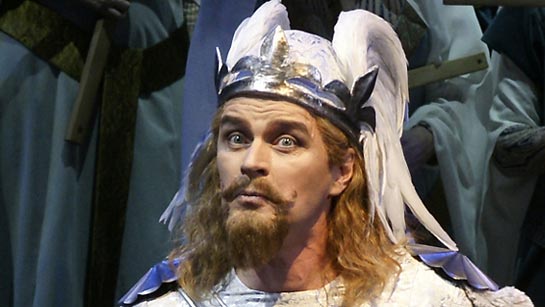
Klaus Florian Vogt was the star of the evening, receiving massive and loud applause, almost of Bayreuth dimensions.
Photo: Karl Forster / Staatsoper Berlin
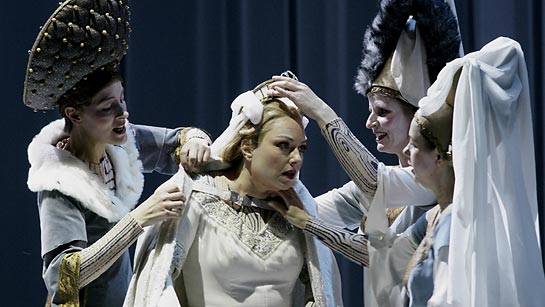
Dorothea Röschmann as Elsa is about to experience the "happiness" of a marriage to a man.
Photo: Karl Forster / Staatsoper Berlin
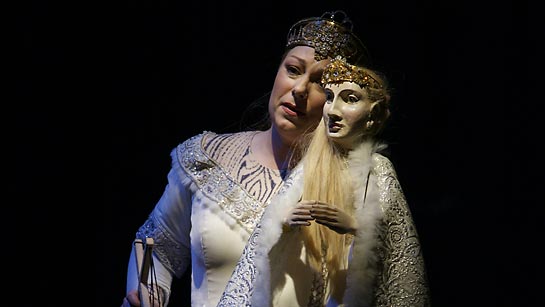
Dorothea Röschmann as Elsa von Brabant - a doll in a doll's house, carrying a doll.
Photo: Karl Forster / Staatsoper Berlin
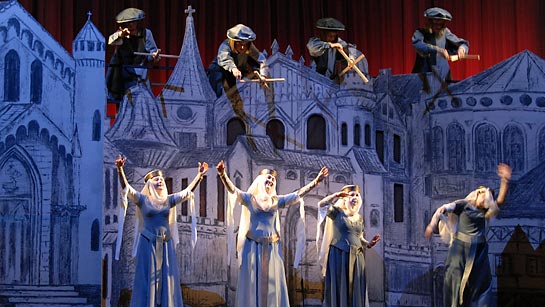
Frauen coming in from the right in Act 3 as puppets. They are dissatisfied, however, with their existence as marionettes and take control over the marionette cross. Hilarious was the entrance of the fourth lady - her right hand was hooked up on her back, which made her angry as hell. Everyone who has played with marionettes could relate to this situation. And everyone who has tried to take control over their own life as well.
Photo: Karl Forster / Staatsoper Berlin
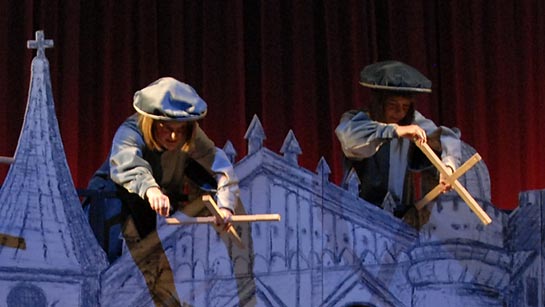
Controlling or be controlled, that's the question in Stefan's Herheim's Lohengrin.
Photo: Karl Forster / Staatsoper Berlin
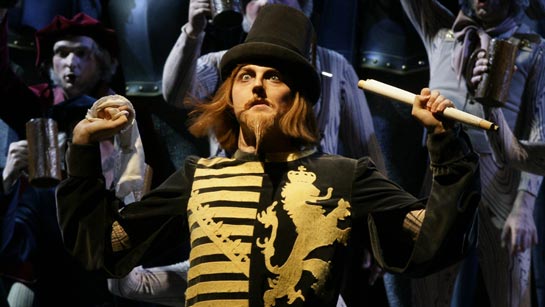
If you can't have power or love - at least you could get attention. The effeminate exhibitionist of a Heerrufer (Arttu Kataja) could have been taken right out of a Black Adder episode. His desperate need of attention created well deserved laughs in the audience.
Photo: Karl Forster / Staatsoper Berlin
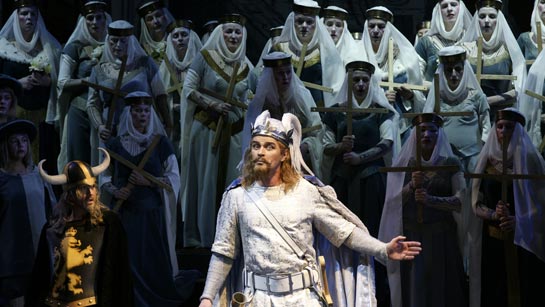
The kitschy Lohengrin could seduce almost everyone, but not the Viking from Norway (Telramund, played by Gerd Grochowski) or his wife Ortrud, who went mad, perhaps under the strain of the naivity, the submissiveness and the easy mislead people who refused to learn.
Photo: Karl Forster / Staatsoper Berlin
The great qualities of this production does not only show itself in the many creative crazy ideas. Also in the In fernem Land "aria" and the duets between Elsa and Ortrud, and (especially) Elsa and Lohengrin in the bridal chamber (rather stupidly criticized by some for being "conventional") a remarkable intensity is retained with little or no external effects. The interaction and the nerve is concentrated and powerful, showing that Herheim can create great music theatre also on the small scale.
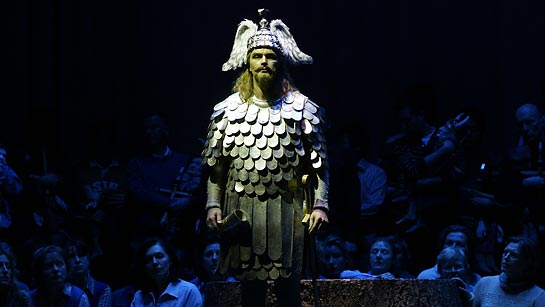
In fernem Land, unnahbar euren Schritten, liegt eine Burg, die Montsalvat genannt; ein lichter Tempel steht dort inmitten, so kostbar, als auf Erden nichts bekannt.
Photo: Karl Forster / Staatsoper Berlin
One of the many highlights of the premiere evening was Klaus Florian Vogt captivating ears and hearts with a beautifully sung fairytale. Unfortunately it was too late for Lohengrin - his grailytale did not succeed. Eyes were opened. In the end no one could believe the kitschy nonsense from a totalitarian kitschler, who literally fell down from heaven.
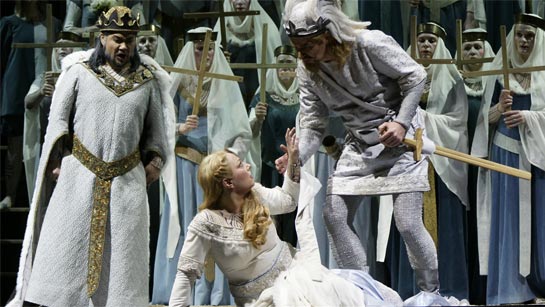
No wonder Elsa was afraid of the Lohengrin character in Berlin.
Photo: Karl Forster / Staatsoper Berlin

Photo: Staatsoper Berlin
Daniel Barenboim's beloved Staatsoper orchestra, Staatskapelle, seemed rather painfully underrehearsed. Their play ranged from the extraordinary to the mediocre (even below mediocre). Barenboim's tempi were on the fast side, creating an intense energy, and there were moments at the premiere, especially in the string section, that made you feel that this music comes from a distant land, unnahbar eure Schritte, up there some place.
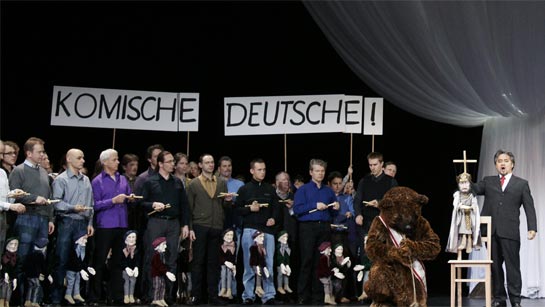
Photo: Karl Forster / Staatsoper Berlin
Although it makes sense that the chorus (in this production meaning the ordinary people in Berlin) should be fighting for their opera houses, this solution creates the duller and more confusing elements of the production. It is not well integrated in the overall structure. Neither is the contemporary politics regarding Berlin's opera houses very interesting to watch as music theatre, nor is this element to be seen later in the production (as far as I could see).
The problem, as I see it, with this kind of reduction is that the tension disappears. One meaning is no meaning.
Reviews
Süddeutsche Zeitung: In diesem "Lohengrin" aber formuliert Herheim, der sich wieder einmal als großer Puppenspieler erweist, eine reizvoll eigene Bildhypothese zu den "Lohengrin"-Rätseln. Er nimmt sie spielerisch, witzig, reiz- und phantasievoll, phantastisch und charmant.
[…]
Zum von Daniel Barenboim und der Staatskapelle wundervoll konzentriert, zurückhaltend und imaginativ musizierten Vorspiel sieht man Richard Wagner höchstselbst auf dem Stumpf einer gefällten deutschen Eiche liegen. Zur Deutschtümelei und Kampfseligkeit dieser Oper fallen Herheim und seinen Ausstatterinnen Heike Scheele und Gesine Völlm viele solche zur Parodie drängenden Allegorien ein, die das Pathos wohltuend unterspielen.
[…]
Zu Beginn senkt sich ein gewaltiger Kelch aus rot angeleuchtetem Stoff herab. Dass dies der Gral sein soll, ahnt man. Dass er bruchlos und ohne Hintergedanken in einen Bühneneffekt verwandelt wird, gehört wie selbstverständlich zu Herheims Zaubertheater. In den magischen Stoffbahnen des Grals - immer wieder anders angeleuchtet, geöffnet, neu gefältelt, geschlossen - ereignen sich alle magischen Momente dieser Oper. Um ihn herum stehen staunend der König des mächtig aufsingenden Kwangchul Youn und der Chor in Alltagskleidung. Sie aber lassen sich von dem die Requisiten des 19. Jahrhunderts beschwörenden Marionettenspiel genauso bezaubern wie zuletzt auch das laut jubelnde und nur wenig buhende Publikum. So rückt Herheim Wagners "Lohengrin" in die Nähe einer Volksbelustigung.
[…]
Herheims Theater ergibt sich dem vordergründig Faszinierenden. Dass er die von Wagner sorgfältig ausgedachte Problematik kühn auseinanderfallen lässt, dass er die hochgestochenen Ideenwelten aufs Volkstheater zurückführt, ist wohltuend, befreiend, ja sogar immer wieder hinreißend.
[…]
Die Inszenierung bestätigt, dass Stefan Herheim, bei allen Vorbehalten, gegenwärtig Deutschlands aufregendster Regisseur im Musiktheater ist.
Mark Berry: Like the Parsifal, this is a multi-layered production, which would doubtless reveal further secrets upon further acquaintance. However, even upon a first viewing, an array of intricately interconnected ideas revealed themselves, whilst still – and this is perhaps the greater achievement – providing theatrical excitement, coherence, and engagement with the work, not least in its musical form. Unlike many of his directorial colleagues, Herheim is a musician – and it shows.
Frankfurter Allgemeine Zeitung: Der Norweger Stefan Herheim, das gefragteste Enfant terrible zeitgenössischer Musiktheaterregie, gilt spätestens seit seinem Bayreuther „Parsifal“ von 2008 als Wagner-Exeget von hohen Graden, der dessen vieldeutiges Werk mit ebenso viel konzeptionellem Tiefsinn wie doppelbödigem Humor, rezeptionskritisch und doch getragen von einem urwüchsigen Sinn für pralles Theaterleben, zu inszenieren versteht. Bei seinem Berliner „Lohengrin“ setzt er diese Linie nun erfolgreich fort, wiederum in Zusammenarbeit mit einem bewährten Team um Heike Scheele (Bühne), Gesine Völlm (Kostüme) und den Dramaturgen Alexander Meier-Dörzenbach. Gemeinsam glückt ihnen eine Lesart, die Wagners Schwanenrittersage zum Anlass nimmt, um mit leichter Hand an Grundfragen der Kunst und des Lebens zu rühren.
[…]
Die magische Bebilderung der Ouvertüre ist hier einmal keine Regiemarotte, sondern essentieller Teil der Konzeption
[…]
Herheim erzählt hier kluge Geschichten über und neben der eigentlichen Handlung, die das Geschehen auf oft frappierende Weise neu beleuchten. Etwa wenn die schlangenhafte Ortrud (Michaela Schuster) bei ihrer Beschwörung „Entweihte Götter!“ per Videoüberblendung zur heidnischen Baumgottheit wird, von deren Ästen der besagte Apfel gleich dutzendweise fällt. Auch die Marionettenmetapher wird immer wieder erhellend aufgegriffen: Zum einen kaschiert sie elegant die immensen Zeitsprünge der Inszenierung, die virtuos zwischen den vier Ebenen von Paradies-, Handlungs- und Entstehungszeit sowie unserer eigenen Gegenwart wechselt.
[…]
Verglichen mit der Dichte und Stimmigkeit der Regie, blieb die musikalische Seite des Abends eher blass.
Die Welt: Sein "Parsifal" auf dem Grünen Hügel im letzten Juli war eines der vielschichtigsten, bildersattesten und am souveränsten gedeuteten Musiktheatererlebnisse der letzten Jahre; in Bayreuth gelang es dem heute 38-jährigen Norweger, das Gralsgeschehen neu und logisch auszulegen - und das trotz Christoph Schlingensiefs allzu kurz gespielter, wohl noch länger nachhallender Vorgänger-Inszenierung als quer durch die Kunstgeschichte walzender Installations-Zentrifuge. Doch mit der "Lohengrin"-Glamour-Premiere der österlichen Barenboim-Festtage an der Berliner Lindenoper kam der Regisseur nicht wirklich klar. Offensichtlich ringt er verbissen mit diesem monströs säbelrasselnden, ideologisch verblendeten Werk eines männerchorbündischen Fanatismus und Nationalismus - es geht um Wagners problematischste, weil eindimensionalste Oper. Doch Herheim hat keine echte Lösung zu bieten.
Die Zeit: Alles hat in dieser Produktion einen doppelten Boden, seine desillusionierende Rückseite, ein holzgeschnitztes Herz oder eine Seele aus Sägemehl. Denn der Regisseur Stefan Herheim hat die Vorbehalte und Zweifel, die er gegen das Stück hegt, immer mitinszeniert. […] Im Schlussbild kracht dann das überkomplizierte Inszenierungskonstrukt überraschend banal in sich zusammen: Die Bühnendecke stürzt auf die orientierungslosen Menschen herab, und auf einem Schild liest man die alte Wagner-Parole, die immer und überall passt: »Kinder, schafft Neues.«
Frankfurter Rundschau: Und so staunen sie ihn dann eben auch an, die Bürger: als nie gesehenes Wunder. Und vor allem Elsa, "die Tugendhafte", von Dorothea Röschmann mit lyrischer Inbrunst verkörpert, himmelt hoch jauchzend. Kein Paar ist in dieser Konstellation heute denkbar. Da aber die Liaison zwischen Elsa und dem heiligen Ritter beschlossene Sache ist, weiß auch Lohengrin, was unausweichlich ist: "Ich liebe dich". An dieser Stelle fährt Herheim dazwischen und sagt: Gut, wenn ihr solchen Kitsch glaubt, dann bleibt mir keine andere Wahl, als den selbigen zu servieren.
Nordbayerische Kurier: Herheims große Kunst aber, die Schaffung kräftiger, schlüssiger Bilder wie eine aus der Partitur geborene, bestechend klare Personenregie – Qualitäten, die ihn von nahezu allen seinen Kollegen abheben –, ist auch hier untrüglich: Etwa die Telramund-Ortrud-Szene im zweiten Aufzug, in der Ortrud Telramund vor sich auf die Knie zwingt, um zum Racheduett anzusetzen, währenddessen der projizierte Mond im Hintergrund zu einer hässlichen Fratze mutiert. Oder das Ende der Brautgemach-Szene, als das Straßenvolk das Podest auseinanderschiebt und Elsa mit sehnsuchtsvoll ausgestrecktem Arm im rechten Bühnenbereich verschwindet.
Intermezzo: Stefan Herheim's new production is as subtly allusive and ultimately impenetrable as the music itself. […] Klaus Florian Vogt's bearded Viking Lohengrin was a perfect blend of spirituality and belligerence. What always amazes about his voice live - it's something recordings just don't pick up - is its sheer size, almost alarmingly beautiful in so delicate an instrument.
Financial Times: Herheim makes a series of laboured points about King Heinrich, Wagner and repressive social structures, linking Lohengrin’s world with the current squabbles between the city of Berlin and its three opera houses. It is painfully didactic, emotionally sterile and incoherent. […] This was not the Staatsoper’s worst Wagner staging in recent years – Bernd Eichinger’s Parsifal still holds that prize – but it was not the company’s finest hour.
Stuttgarter Nachrichten: Genial vieldeutig: Stefan Herheim inszenierte, Daniel Barenboim dirigierte Wagners "Lohengrin" an der Berliner Staatsoper […] Virtuos bewegt Stefan Herheim den gesamten Bühnenapparat - und legt dessen Mechanik mindestens ebenso virtuos vor den Zuschauern bloß. Wie schon der "Parsifal" in Bayreuth ist auch der Berliner "Lohengrin" der Coup eines denkenden Rattenfängers, denn erst die Kombination von großer Bildfantasie mit einem profunden Wissen um Wagners Werke und ihre Rezeptionsgeschichte wie auch um philosophische Verweiszusammenhänge macht jenes Mehrdeutige möglich, das den strukturbildenden Gegensatz von Kunst, Traum, Liebe auf der einen und Wirklichkeit auf der anderen Seite auf der Opernbühne sinnlich begreifbar macht.
Bloomberg: The premiere of Norwegian director Stefan Herheim’s staging on April 4 nonetheless won a warm reception from the Berlin audience, with bravos drowning out boos, even for the production crew. The loudest cheers were for Klaus Florian Vogt as Lohengrin, a role which he sings with incredible clarity. […] Dorothea Roeschmann is a touching Elsa and, with such an insubstantial Lohengrin, it’s a shame Herheim didn’t make more of her character’s human tragedy. More focus, less show would have created a richer production.
NMZ.de: Großer Publikumsjubel für eine ungewöhnliche Neuinszenierung in neuen Bildwelten (Heike Scheele und Gesine Völlm, sowie fettFilm) und ein spielfreudiges Ensemble in Stefan Herheims fesselnder und überzeugender Personenführung.
Bayrern 4 Klasik: Alles prima, aber alles nicht ausgearbeitet.
"Studying Abroad" blogger: Elsa, sung by Doretha Roschmann had a beautiful voice and I loved the interpretation she had of the part. […] Replacing Rene Pape at such short notice, Kwangchul Youn gave a compelling performance as Heinrich. Mezzo soprano, Michaela Schuster as Ortrud was absolutely brilliant and dramatically was a huge stage presence. She seemed to have really grasped the nastiness of Ortrud towards Elsa and not only that, she sung the part magnificently. Klaus Florian Vogt as Lohengrin stole the show and really sung the part in a way that I had not heard before. His interpretation was much different than your standard Wagner heldentenor and almost sung the part as if in a chamber opera.[…] When Herheim came to take his bow, there was a mixture of boos and bravos. I personally thought the production was brilliant and his commentary on the current financial situation plaguing German opera house along with his comedic take on other Wagner operas mixed in with a rather traditional looking lead cast (in medieval costume even!), the production worked.
Berliner Zeitung: Gerade im Bereich der Berliner Wagner-Regie der letzten Jahre ist Herheims Inszenierung dank ihres oft brillanten Handwerks, ihrer Fantasie und ihrer originellen Perspektive ein Ereignis ersten Ranges ... Statt die Mehrdeutigkeiten des »Lohengrin« durch »Interpretation« zu einsinnigen Tendenzen zu frisieren, stellt Herheim sie erst recht aus. Damit kommt er der Wahrheit des Stücks, seiner Unentschiedenheit zwischen Aufklärung und Mythos bedrohlich nahe. Dass dies ausgesprochen spielerisch, mit einem ganz unmittelbaren Sinn für theatralische Wirkungen geschieht, ist die große Kunst dieses Regisseurs.
Mostly Opera: I do not recall any new staging of any Wagnerian opera, which appealed so little to me than this Lohengrin. Daniel Barenboim, on the other hand, was sensational. [...] I simply didn´t understand the concept. It was a confusing, un-dramatic as well as highly intellectual mish-mash which brought me nothing. And worst of all: It took all the attention away from the music.
Background material to the production
- Wagneropera.net's pre-production interview with dramaturg Alexander Meier-Dörzenbach
- Hermann Grampp interviews Stefan Herheim about Lohengrin for Nordbayerische Kurier (in German)
- Der Tagesspiegel: Interview with Stefan Herheim (in German)
Background to Barenboim / Herheim conflict
- Die Welt: Regisseur Herheim nennt Barenboim "disziplinlos"
- Bloomberg: Barenboim Spars With Director, Ponders Hitler’s Love of Music
Other background material
Singers with homepage



